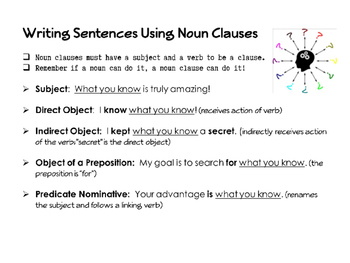What Is A Noun Clause | Become comfortable with the concept by reading through this helpful guide! Adjective complements often provide a reason why someone or something is a certain way. If you are uncertain whether a part of a sentence is functioning as a noun clause, try replacing it with a pronoun; Like all clauses, a noun clause has a subject and a verb. A noun clause is a dependent clause that acts as a noun.
A content clause, also known as a noun clause, provides content implied or commented upon by its main clause. Simply put, a noun clause is a dependent clause that takes the place of a noun in the sentence. If the sentence is still grammatically complete, then the part you replaced is a noun clause. Like all clauses, a noun clause has a subject and a verb. Noun clauses can act as subjects, direct objects, indirect objects, predicate nominatives, or objects of a preposition.

A noun clause is a dependent clause that acts as a noun. A content clause, also known as a noun clause, provides content implied or commented upon by its main clause. Jul 27, 2021 · the term noun clause might sound confusing, but finding and identifying one is much easier than you might think. A noun clause may have you questioning your grammar knowledge. Adjective complements often provide a reason why someone or something is a certain way. It can be a subject, predicate nominative, direct object, appositive, indirect object, or object of the preposition. Noun clauses begin with words such as how, that, what, whatever, when, where, whether, which, whichever, who, whoever, whom, whomever, and why. Become comfortable with the concept by reading through this helpful guide! What is a noun clause? Noun clauses can function as subjects, objects, or complements. This page has lots of examples of noun clauses and an interactive exercise. A noun clause is a clause that functions as a noun. A content clause, also known as a noun clause, provides content implied or commented upon by its main clause.
Jul 27, 2021 · the term noun clause might sound confusing, but finding and identifying one is much easier than you might think. A noun clause is a dependent clause that acts as a noun. A content clause, also known as a noun clause, provides content implied or commented upon by its main clause. Jan 30, 2018 · noun clause:. A noun clause can always be replaced by a single pronoun (such as you, he, she, it, they, there, etc.), the same way a normal noun would.

If you are uncertain whether a part of a sentence is functioning as a noun clause, try replacing it with a pronoun; A noun clause is a clause that functions as a noun. Become comfortable with the concept by reading through this helpful guide! A noun clause is a dependent clause that acts as a noun. = subject complement of 'uncertainty' describing what is uncertain noun clauses can play the role of an adjective complement. A content clause, also known as a noun clause, provides content implied or commented upon by its main clause. A noun clause can always be replaced by a single pronoun (such as you, he, she, it, they, there, etc.), the same way a normal noun would. Like all clauses, a noun clause has a subject and a verb. A dependent clause is a. Noun clauses can act as subjects, direct objects, indirect objects, predicate nominatives, or objects of a preposition. This page has lots of examples of noun clauses and an interactive exercise. Simply put, a noun clause is a dependent clause that takes the place of a noun in the sentence. Jul 27, 2021 · the term noun clause might sound confusing, but finding and identifying one is much easier than you might think.
What is a noun clause? If the sentence is still grammatically complete, then the part you replaced is a noun clause. Become comfortable with the concept by reading through this helpful guide! If you are uncertain whether a part of a sentence is functioning as a noun clause, try replacing it with a pronoun; A content clause, also known as a noun clause, provides content implied or commented upon by its main clause.

Jan 30, 2018 · noun clause:. = subject complement of 'uncertainty' describing what is uncertain noun clauses can play the role of an adjective complement. Jul 27, 2021 · the term noun clause might sound confusing, but finding and identifying one is much easier than you might think. Noun clauses can act as subjects, direct objects, indirect objects, predicate nominatives, or objects of a preposition. If the sentence is still grammatically complete, then the part you replaced is a noun clause. This page has lots of examples of noun clauses and an interactive exercise. Noun clauses can function as subjects, objects, or complements. A dependent clause is a. A noun clause may have you questioning your grammar knowledge. Noun clauses begin with words such as how, that, what, whatever, when, where, whether, which, whichever, who, whoever, whom, whomever, and why. It can be a subject, predicate nominative, direct object, appositive, indirect object, or object of the preposition. Like all clauses, a noun clause has a subject and a verb. What is a noun clause?
What Is A Noun Clause: This page has lots of examples of noun clauses and an interactive exercise.
0 Tanggapan:
Post a Comment